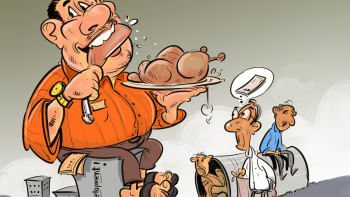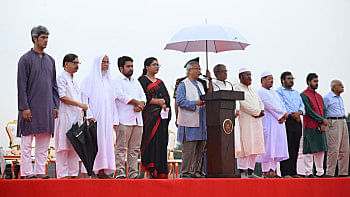Spare a thought for general power users, too

It seems almost pointless to ask if there is any plan at all – beyond putting all the financial burden on ordinary citizens – to address the difficulty caused by the volatility in international fuel prices. Yet, we must, for the situation has gone totally gone out of control. The government on Tuesday again increased electricity price by 5 percent at the retail level – for the second time in 19 days – which means that a consumer who paid Tk 1,000 a month, for example, will now have to pay Tk 1,100 for the same amount of electricity.
The latest hike comes a day after an amendment bill was passed in parliament – following a cabinet decision a month before – paving the way for the government to fix all kinds of energy prices without a public hearing, as was the norm before. One may also recall the decision, on January 18, to raise the retail prices of gas by 14.5 to 178.9 percent for industries, power plants and commercial establishments. All this is part of a drive to wean the power sector off subsidies and let consumers – households and industries alike – bear the burden. But for the fixed-income people, this is becoming too much to bear, as the frequent hikes in prices of utilities in recent months also caused prices of almost all essentials and services to rise uncontrollably.
One shudders to think what the situation will be like if this trend continues. Nasrul Hamid, the state minister for power, energy and mineral resources, did suggest that the government will "adjust" electricity price every month depending on the international market, meaning power consumption may become even costlier going forward. The question is, will price adjustment only mean price increase? What if international prices go down? Will the government be as interested in bringing down prices as it is in pushing them up? Why are domestic prices so rarely revised down?
Experts have rightly questioned the government's approach to the problem. They said that the government lacks a clear strategy for tackling the impacts of the volatility in international market or bringing down subsidies. We must also question the tendency to put the price burden on consumers, instead of curbing corruption and unreasonable expenses on the electricity production side, which could have saved a lot of money. There is, experts believe, a lot of ways to cut the government's financial burden like preventing system loss, sharing the burden with the power producers, etc. So why is it pushing the burden on consumers instead?
We urge the government to adopt a proactive rather than reactive approach to the fuel price issue – in which, as well as revising domestic prices in line with international prices, the government will undertake measures to avoid being so vulnerable in the first place. For that, we must first reduce our overdependence on fuel imports, and start exploring our own gas reserves. We must also prevent all kinds of system losses. The authorities must consider other ways of handling this problem to reduce the suffering of ordinary citizens.


 For all latest news, follow The Daily Star's Google News channel.
For all latest news, follow The Daily Star's Google News channel. 








Comments